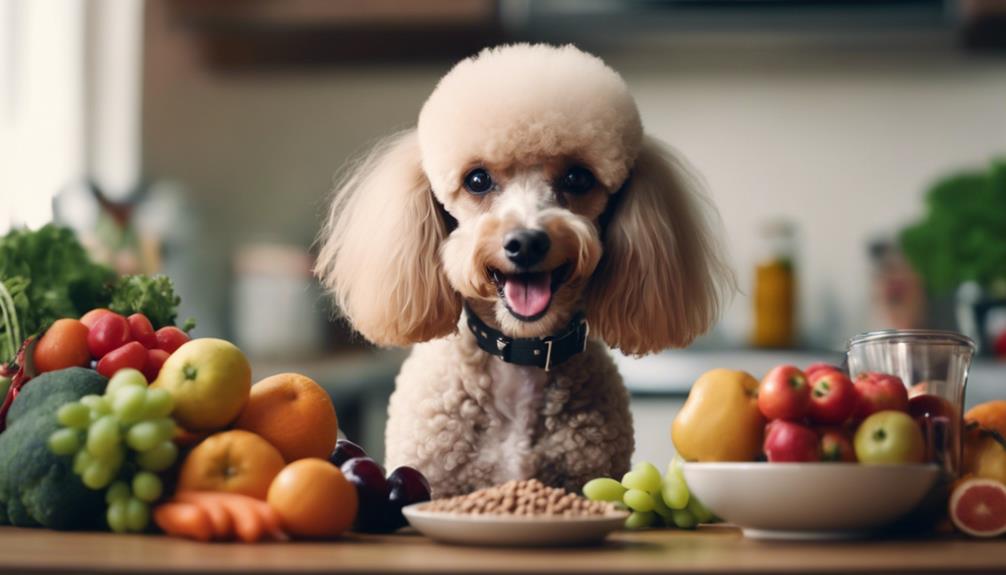When it comes to your poodle's health, did you know that nearly 56% of dogs in the United States are classified as overweight or obese? Understanding the right balance of calorie intake for your furry friend is essential, but it can sometimes be a confusing task. By learning how to tailor their diet to meet their individual needs, you can ensure your poodle maintains a healthy weight and enjoys a happy, active lifestyle. So, how can you make sure your poodle gets the right amount of calories without overdoing it? Keep reading to find out more.
Key Takeaways
- Proper calorie balance is crucial for Poodles' overall health and weight management.
- Adjust caloric intake based on age, activity level, and health status for optimal nutrition.
- Regular monitoring and gradual adjustments help prevent obesity and maintain ideal weight.
- Consult a veterinarian for personalized caloric needs and dietary management advice.
Importance of Calorie Balance
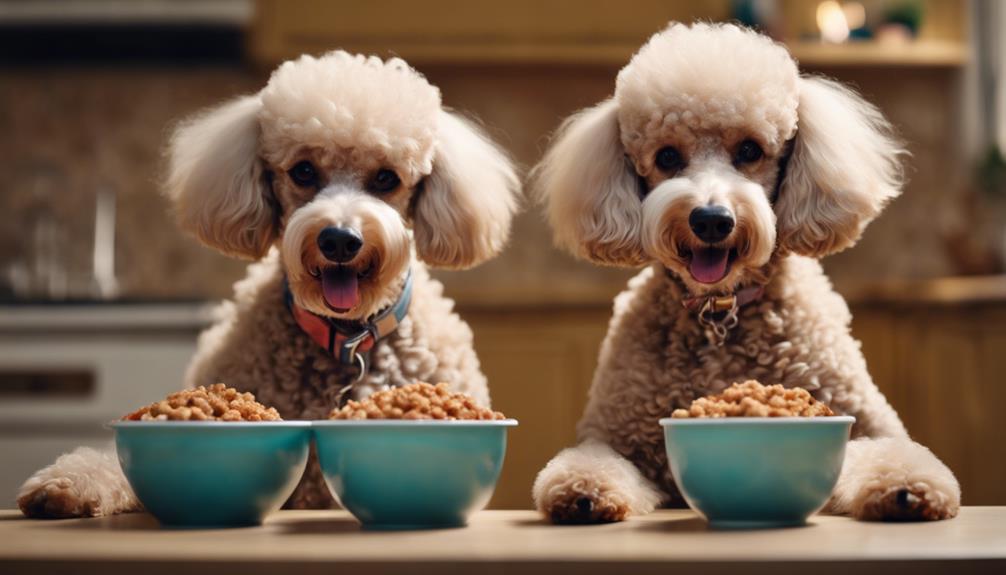
Proper calorie balance plays a fundamental role in safeguarding the optimal weight and health of Poodles. As a Poodle owner, understanding the nutritional value of the pet food you provide is essential. The right balance of calories supports your Poodle's immune system, helps maintain an ideal weight, and provides the necessary energy needs based on their activity level and life stage. By ensuring your Poodle receives the appropriate caloric intake, you can prevent health conditions related to obesity and malnutrition.
Moreover, a well-balanced diet can contribute to a Poodle's overall well-being, including the health of their skin and coat. Monitoring calorie intake is particularly crucial for Poodles prone to digestive issues, as excess calories can exacerbate these problems. By being mindful of your Poodle's caloric needs and adjusting their diet accordingly, you can promote longevity and vitality in your furry companion.
Calculating Poodle's Caloric Needs
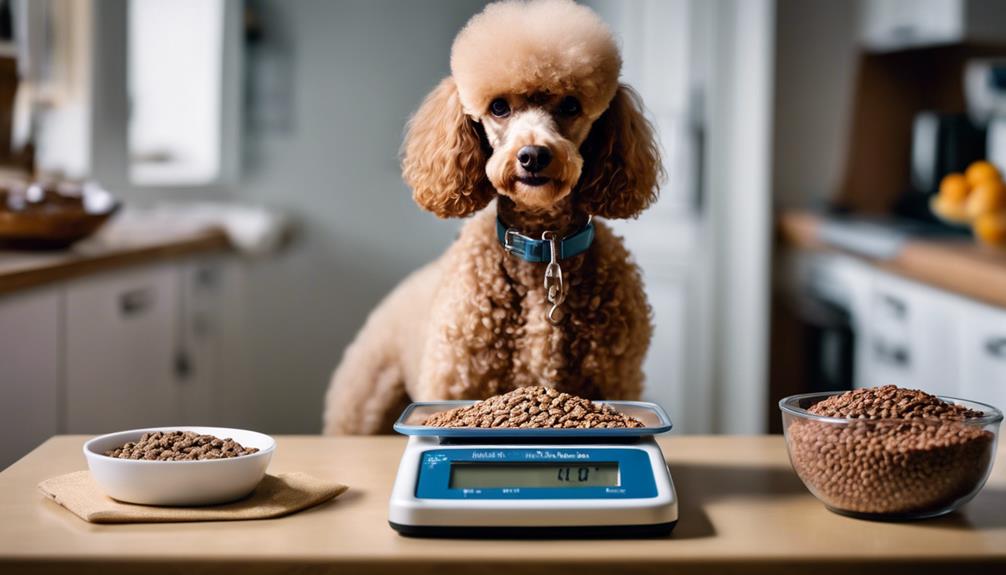
To accurately determine your Poodle's caloric needs, start by calculating their Resting Energy Requirements (RER) using a specific formula based on their ideal weight. This formula involves raising the ideal weight in kilograms to the power of 0.75, then multiplying the result by 70. The RER gives an estimate of the daily energy required for vital bodily functions in Poodles. When managing caloric intake, factors such as age, size, activity level, and overall health play a significant role. It's crucial to adjust the daily caloric intake for weight management purposes, always seeking guidance from a veterinarian for tailored advice. If weight loss is necessary, supervised programs should aim for a gradual reduction of 1-5% of the body weight per month to ensure the Poodle's well-being while reaching a healthy weight.
Factors Affecting Calorie Intake
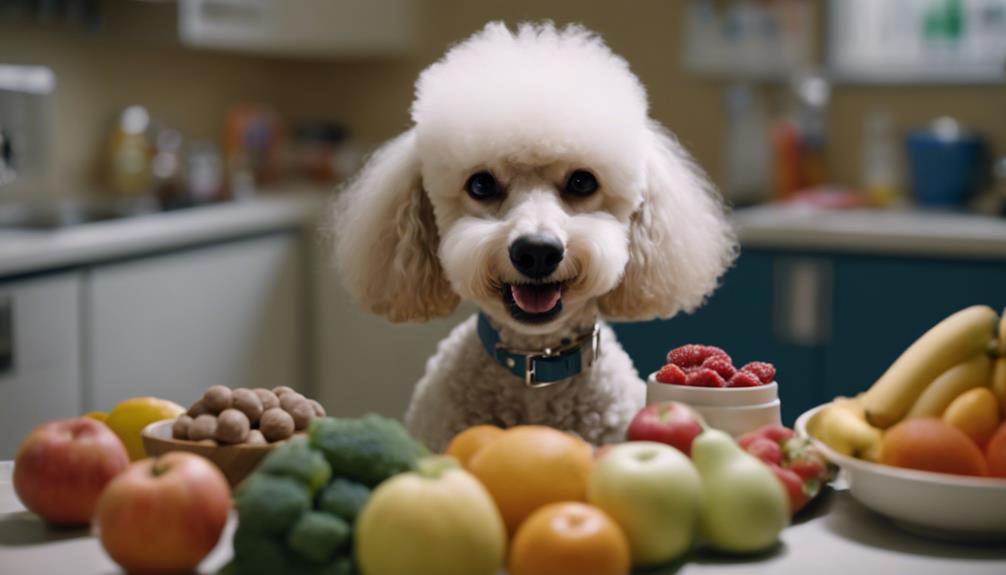
Factors such as age, size, activity level, metabolism, and overall health status significantly influence the calorie intake required for Poodles. Understanding your Poodle's individual needs is crucial in providing the right balance of nutrition. Puppies and highly active Poodles have higher energy requirements, necessitating more calories than senior or less active dogs. Essential fatty acids are vital for a healthy coat and overall well-being, making them a key component of your Poodle's nutritional needs. When considering the best dog food for your Poodle, opt for options that contain healthy fats to support their overall health. Monitoring your Poodle's weight, body condition, and energy levels is essential to prevent issues like obesity or malnourishment. Consulting with a veterinarian or nutritionist can help you determine how much to feed your Poodle and ensure correct feeding practices. By being mindful of these factors and making informed choices, you can support your Poodle's common health and maintain a healthy weight.
Adjusting Calorie Intake as Needed
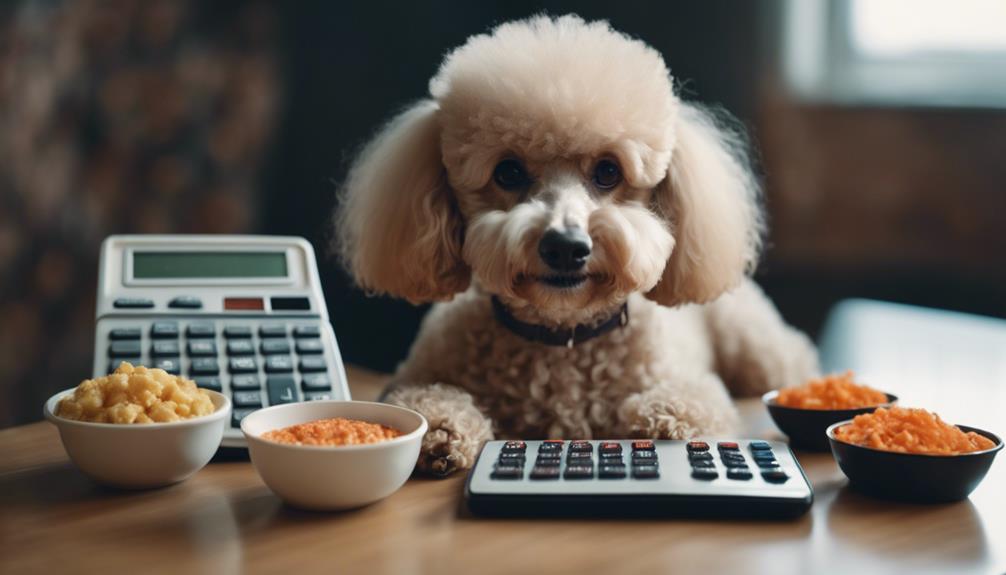
To ensure your Poodle maintains a healthy weight and overall well-being, it is crucial to monitor and adjust their calorie intake as needed based on factors like activity level, metabolism, and age. Here are some key points to consider when adjusting your Poodle's calorie intake:
- Consult with a vet: Seek professional advice to determine the right caloric intake for your Poodle's specific needs, taking into account any medical conditions or dietary requirements.
- Gradual adjustments: When changing your Poodle's calorie intake, do so gradually to prevent sudden weight changes and allow your dog's metabolism to adjust accordingly.
- Track treats and snacks: Keep a close eye on the additional treats and snacks your Poodle consumes to ensure they don't exceed the daily calorie limits set for them.
- Maintain a balanced diet: Ensure your Poodle's food is nutritionally balanced, providing essential vitamins and minerals, high-quality protein, and key ingredients that support dental health and overall well-being. Adjusting their calorie intake appropriately will not only help manage your dog's weight but also prevent conditions related to over or underfeeding.
Monitoring Poodle's Weight and Health
Regularly monitoring your Poodle's weight and health is essential for ensuring they maintain an ideal body condition and overall well-being. Tracking changes in weight and observing the body condition score are crucial indicators of your Poodle's health status. By consulting with a veterinarian, you can develop a customized weight management plan tailored to your Poodle's individual needs. Keeping a detailed food diary will help you accurately monitor your Poodle's caloric intake and make necessary adjustments to maintain an ideal weight. Additionally, incorporating a consistent exercise routine into your Poodle's lifestyle will complement their diet, promoting overall health and well-being. It is important to monitor changes in your Poodle's weight and body condition regularly to ensure they are on track with their ideal weight. By proactively managing their weight and health through a personalized plan, you can help your Poodle lead a long and healthy life.
Frequently Asked Questions
How Many Calories Should a Poodle Eat a Day?
To determine how many calories your Poodle should eat daily, consider factors like age, activity level, and health. Consult a vet for personalized advice on nutrition, exercise, weight management, and treats. Portion control and a feeding schedule are key for overall health.
What Is a Healthy Diet for a Poodle?
For a healthy diet, a Poodle needs balanced nutrition with high-quality protein sources, essential fatty acids, and omegas. Include dietary supplements, healthy treats in moderation, portion control, proper meal frequency, weight management, meet nutrient requirements, consider homemade meals, and consult a vet.
How Much Food Should a Standard Poodle Eat?
Wondering how much food your standard Poodle should eat? Consider their weight management, portion control, meal frequency, treat allowance, exercise routine, and nutritional balance. Consult with your vet to determine the ideal feeding schedule for your pup's needs.
How Many Cups of Food Should I Feed My Poodle?
When determining how many cups of food to feed your poodle, consider their caloric needs, weight, and activity level. A balanced feeding schedule, portion control, and monitoring are crucial for weight management and meeting their nutritional requirements.
Conclusion
In conclusion, managing the right balance of calorie intake is essential for your poodle's health and well-being. By understanding their daily energy requirements and monitoring their weight regularly, you can ensure they maintain a healthy weight. Remember, proper nutrition is key to keeping your furry companion happy and energetic. Are you ready to take charge of your poodle's diet and make sure they're getting the right amount of calories they need to thrive?
